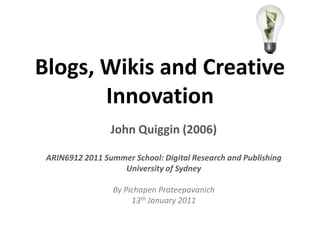Blogs, wikis and creative innovation(ARIN6912'11)
- 1. Blogs, Wikis and Creative InnovationJohn Quiggin (2006)ARIN6912 2011 Summer School: Digital Research and PublishingUniversity of Sydney By PichapenPrateepavanich13th January 2011
- 3. Blogs vs Wiki http://www.youtube.com/watch?v=ozRK7VXQl-k&feature=fvw
- 6. Intellectual Property Rights ŌĆ£ the ease of reproducing, transmitting, and storing information, facilitated by the internet, changed the balance of costs and benefits in relation to intellectual propertyŌĆØ- Quiggin (2006) p493
- 7. New Innovation VS Mainstream MediaŌĆ£Blogs and wikis will soon displace mainstream media.ŌĆØ ŌĆō The triumphalist view (Hewitt, 2005)Blog and wiki will allow dismissive responses of the media establishment, and that aphorisms are what ŌĆ£nitpicking is to film criticism as blogging is to journalismŌĆØ (Sutherland, 2005)It will give ŌĆ£more balanced and sophisticated treatment of blogs, wikis and other online media forums.ŌĆØ (Bruns, 2005)
- 8. QuigginŌĆÖs ConclusionBlogs and wikis are ŌĆ£a direct replacement for existing communication media.ŌĆØIt has ŌĆ£creative commonsŌĆØ which are driven by creative motives (such as excellence, self-expression, altruism and sheer enjoyment), instead of monetary or organizationalŌĆØ.ItŌĆÖs a ŌĆ£common poolŌĆØ that enables users to contribute freely.
- 9. QuigginŌĆÖs Recommendation Instead of focusing on enforcing copyrights and encouraging competitions, authorities should make sure that co-orporation and creativity are promoted towards increased productivity.
- 10. New Media and its users
- 11. Paradigms of Publishing ŌĆ£The hard copy publishing is under challenge (again) from a new paradigms: of production and distribution of texts in the digital medium. This is no head-on attack, however, but a reconfiguration of the ways in which we create and circulate knowledge.ŌĆØ
- 12. Print Publications VS E-Bookhttp://www.google.com.au/imgres?imgurl=http://images.theage.com.au/2009/06/15/572038/kindle_10_gallery__467x400-420x0.jpg&imgrefurl=http://www.theage.com.au/digital-life/hometech/kindle-opens-a-new-chapter-in-publishing-20091012-gu3w.html&usg=__AHuoRYylLmsPHo_7HZt027rrA3Y=&h=360&w=420&sz=51&hl=en&start=78&zoom=1&tbnid=Smc8p-Er7RN7-M:&tbnh=147&tbnw=172&prev=/images%3Fq%3Debook%2Bvs%2Bprint%2Bbook%26um%3D1%26hl%3Den%26cr%3DcountryAU%26sa%3DN%26biw%3D1259%26bih%3D818%26tbs%3Disch:1,ctr:countryAU0%2C1841&um=1&itbs=1&iact=hc&vpx=345&vpy=437&dur=109&hovh=208&hovw=243&tx=148&ty=140&ei=RJEuTfNWwZuWB_STmXs&oei=N5EuTcv8JIW6cfTukOcI&esq=4&page=4&ndsp=25&ved=1t:429,r:7,s:78&biw=1259&bih=818
- 13. Mobility
- 15. New Author ŌĆō Reader interaction
- 16. New Author ŌĆō Reader interaction
- 18. Citizen JournalismWHO: ANYONE can be the media: report from everywhere/anywhere we locate at the time of event. No skills/ profession required. WHAT: user generated content. People use the modern technology to communicate via INTERNET (global distribution) to create an augment or fact-check media (whether individually or collectively).
- 20. Citizen Journalism VS Mainstream MediaMainstream media becomes ŌĆśsecond reporterŌĆÖ as witnesses have turned themselves into 'citizen reporterŌĆś.Anyone can write about their own area of expertise, and perhaps more insightful, in various angles and more freely than journalists from TV, Radio, and Print media. We seek the truth by screening the sourceŌĆÖs credibility and the validity of information through collaborative harvesting.
- 21. Clip
- 22. References Guiggin, J. (2006) Blogs, kiwis and creative innovationŌĆÖ. International Journal of Cultural studies www.Emarketer.com [PR Week and PR Newswire, 2010 PR WEEK/PR Newswire Media Survey* April, 2010]www.blogs.crikey.com.au/.../citizen-journalism-the-benefit-of-j-labs-experiencehttp://www.onlineopinion.com.au/documents/reports/annual_report_to_agm_2005.pdf
- 23. Q & A






















![References Guiggin, J. (2006) Blogs, kiwis and creative innovationŌĆÖ. International Journal of Cultural studies www.Emarketer.com [PR Week and PR Newswire, 2010 PR WEEK/PR Newswire Media Survey* April, 2010]www.blogs.crikey.com.au/.../citizen-journalism-the-benefit-of-j-labs-experiencehttp://www.onlineopinion.com.au/documents/reports/annual_report_to_agm_2005.pdf](https://image.slidesharecdn.com/blogswikisandcreativeinnovationdigisummer11-110113003223-phpapp02/85/Blogs-wikis-and-creative-innovation-ARIN6912-11-22-320.jpg)
